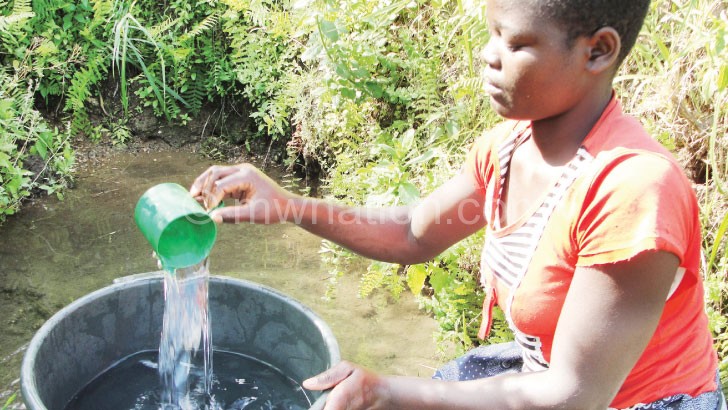MoH tips public on typhoid
An outbreak of typhoid fever at Malosa in Zomba last week has prompted the Ministry of Health (MoH) to issue tips on how to prevent the disease.
In a statement published yesterday, MoH Principal Secretary MacPhail Magwira said signs and symptoms of typhoid fever include gradual onset of high fever over several days, headache, weakness, abdominal pain and constipation.water

The ministry has also alerted the public that if someone around them or someone recently visited Malosa and shows the signs and symptoms mentioned; they should immediately be taken to the nearest heath facility.
Reads the statement in part: “On 2nd July 2016, the Ministry of Health, through Zomba District Health Office [DHO], was notified of an increase in the number of patients presenting to St Luke Hospital with fever, headache, vomiting, abdominal pain and general body weakness.
“Malaria tests were negative. Further investigations [blood culture] by MoH have isolated Salmonella typhi, a bacterium that causes typhoid, from blood samples that were collected. Specifically, the outbreak has affected Malosa Secondary School, St. Luke College of Nursing and St. Luke Hospital.”
According to the notice, as of July 9 2016, 348 cases of typhoid, cumulatively, had been reported from Malosa Secondary School and St. Luke College of Nursing and most of the patients were treated and are well. No person has died due to the outbreak.
The notice also said treatment for typhoid is available at St. Luke Hospital and all other hospitals in the country.
MoH, through the Community Health Sciences Unit in Lilongwe and Zomba working together with affected institutions and communities in Malosa to control the disease, according to the notice.DHO, will continue
The Zomba typhoid outbreak comes on the heels of a similar outbreak, which MoH also registered in Nsambe area in Traditional Authority (T/A) Dambe in Neno.
The Neno outbreak attacked 130 people, but unlike a similar one which killed 35 people in the same area in 2011, no deaths were reported in the recent one. TYPHOID FAST FACTS
It spreads through poor hygiene practices such as:
• Eating a meal without washing hands
• Drinking water from unprotected sources
• Drinking water that is not treated by chlorine or Water guard
• Open defecation due to lack of latrines
• Eating fruits or vegetables that have not been washed or cleaned properly
• Cooking and eating meals that are prepared under poor hygiene What all households, schools, institutions and individuals are encouraged to do in order to prevent typhoid outbreak.
• Treat drinking water with chlorine or water guard; if not, boil the water
• Wash hands with soap after using the latrine or changing baby’s nappies
• Wash hands before preparing food or eating
• Wash fruits and vegetables well before eating them
• Cook food thoroughly and eat it while it is still hot.





